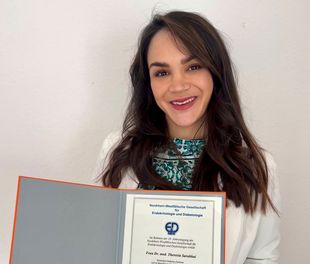Oxidative stress occurs when our cells are exposed to certain oxygen reactions. In metabolism, this can cause damage to cells or their function. The literature describes a connection between oxidative stress and peripheral insulin resistance, i.e. reduced glucose uptake, particularly into muscle and fat cells - an early sign of type 2 diabetes. One of the causes is impaired mitochondrial function. In people with obesity, there is also a reduced oxygen content in the blood and oxidative stress in the white adipose tissue.
The principle of hormesis states that a small dose of harmful stimuli can promote health and strengthen our resistance. "In this context, mitohormesis says that a short-term change, e.g. a change in the nutrient supply to the mitochondria, i.e. our "cell power plants," can stimulate metabolism," explains Prof. Michael Roden, Director of the Clinic for Endocrinology and Diabetology at the University Hospital Düsseldorf and Director of the German Diabetes Center.
Hyperbaric oxygen therapy has many benefits
"Our hypothesis was that therapy with 100% oxygen (O2) in a hyperbaric chamber (hyperbaric oxygenation; HBO) could improve hyperglycemia in people with type 2 diabetes. To do this, we compared the acute effect of a single session of 100% O2 with a session of 21% O2 ambient air in a pressure chamber," said first author Sarabhai, explaining the objective of the study. Her award-winning paper now shows the results of this randomized, placebo-controlled, cross-over study: after a single session of HBO with 100% O2, there was significantly decreased fasting blood glucose and concomitant improved insulin sensitivity in liver, muscle and adipose tissue compared to the control group with only 21% O2. The increased amount of O2 in the blood from hyperbaric oxygen therapy was able to improve oxygen delivery to all tissues, increase insulin action, and stimulate mitochondrial metabolism. "Dr. Sarabhai's work is therefore of clinical relevance because it not only sheds light on the dysfunction at the cellular level in type 2 diabetes but also shows a way to improve the impaired metabolic processes of injured or inadequately supplied tissues - such as in diabetic foot syndrome," said Prof. Roden, assessing the results.
Karl Oberdisse Prize honors NRW scientists
The North Rhine-Westphalian Society for Endocrinology and Diabetology e. V. annually awards the prize for the best clinical or experimental work in the field of endocrinology and diabetology prepared by scientists in North Rhine-Westphalia. During its annual meeting in Cologne, the award was presented to first author Sarabhai, who has been working as a research associate at the German Diabetes Center and the Clinic for Endocrinology and Diabetology at the University Hospital Düsseldorf (UKD) since 2018. "I am very pleased about the trust placed in me and hope that this will herald a new stage in my research work. Together with our team at the DDZ, I look forward to further exciting projects and would like to build on this success," said the award winner.
Personal details:
Theresia Sarabhai studied human medicine at Heinrich Heine University Düsseldorf from 2009 to 2016 and received her doctorate in 2017 at the Department of Orthopedics, Trauma Surgery and Hand Surgery under Prof. Windolf. From 2016 to 2018, she was an assistant physician at the Clinic for Interventional and Diagnostic Radiology and Neuroradiology at the University Hospital Essen. Since 2018, Dr. Sarabhai has been a study physician at the Institute for Clinical Diabetology of the DDZ in Düsseldorf. In May 2020, she also started working as an assistant physician in the Department of Endocrinology and Diabetology at the University Hospital Düsseldorf with Prof. Roden. There she is currently also completing her further training as a specialist in internal medicine, endocrinology and diabetology. The awardee's research focuses on the characterization of lipid, glucose and energy metabolism in humans under physiological conditions and in metabolic disorders such as type 2 diabetes and non-alcoholic fatty liver disease.
Original publication:
Sarabhai T, Mastrototaro L, Kahl S et al. Hyperbaric oxygen rapidly improves tissue-specific insulin sensitivity and mitochondrial capacity in humans with type 2 diabetes: a randomised placebo-controlled crossover trial. Diabetologia 2023;66:57-69. https://doi.org/10.1007/s00125-022-05797-0

